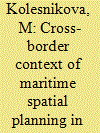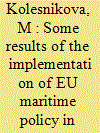|
|
|
Sort Order |
|
|
|
Items / Page
|
|
|
|
|
|
|
| Srl | Item |
| 1 |
ID:
169515


|
|
|
|
|
| Summary/Abstract |
USE OF THE SEA in the modern era is marked by the widespread use by coastal states of maritime spatial planning (MSP). In 2014, almost 40 countries developed or implemented territorial plans for delimiting offshore zones within national EEZs (exclusive economic zones*) and determining their industrial purpose. This practice is employed by states all over the world, including Australia, Israel, Canada, New Zealand, Norway, China, the U.S., the EU member states, as well as several other countries in Africa, Asia, Oceania, North and Central America [8, pp. 14 18].
|
|
|
|
|
|
|
|
|
|
|
|
|
|
|
|
| 2 |
ID:
184022


|
|
|
|
|
| Summary/Abstract |
THE EUROPEAN UNION is actively involved in developing the world ocean. Today, it positions itself not only as a consumer of "ocean resources," but also as a leader of sustainable development and a "global actor" playing an independent role in shaping the system of international ocean governance [1]. The EU's strategic maritime interests are multidimensional and primarily associated with ensuring its security [2:1, 2]. Its maritime interests lie at the junction of overlapping areas of activity, including political, economic, functional, sectoral, spatial, and administrative. Therefore, the implementation of its Maritime Policy is of particular importance to the EU.
|
|
|
|
|
|
|
|
|
|
|
|
|
|
|
|
|
|
|
|
|